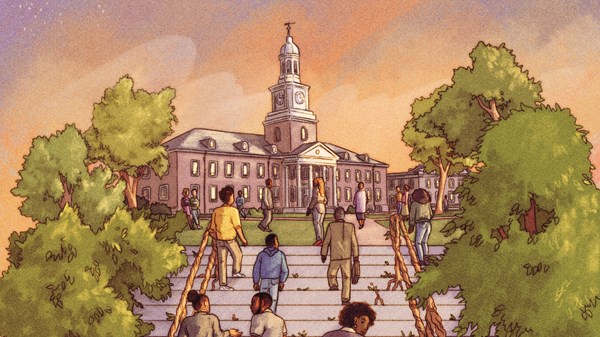The best part of my job as an assistant professor of English at Oklahoma Baptist University is having the opportunity to mentor and love students during one of the most difficult and exciting transitions of their lives. Christian colleges and universities are not unique in offering professor-student mentorship, but with their typically smaller class sizes, their close spiritual communities, and their integration of faith and learning, such mentorship takes on a unique character.
The professor-student relationship at a Christian college or university differs from other relationships the student is likely to have had before. Professors are not pastors, but they are spiritual elders who seek to care for younger brothers and sisters in the faith. Professors are not high school teachers, so they interact with students directly, not through school administration. Professors are not employers, but they do evaluate students based on their work. Professors are not the students’ parents, but they should love them and be concerned for their well-being. Professors are not peers with students, but they often engage with students in more casual settings outside the classroom.
A professor-student relationship can last one semester or four years, but in many cases, it continues long after the student graduates. And since a college is a community, it is common for students to see a professor several times a week for many semesters. I and my colleagues at various Christian colleges regularly interact with our students outside of class in a number of settings: trips to academic conferences, missions trips, study-abroad trips, dinners on campus, dinners in the professors’ homes, game or movie nights, book clubs, social media interactions, intramural sports, Bible studies, and babysitting. Obviously not all students or professors elect to be so involved in the campus community, but a great many do.
These unique mentoring relationships are one of the greatest benefits of Christian higher education. They provide a special time for the cultivation of relationships just as students are entering the awkward and challenging first years of adulthood. When students think of higher education as something more than career training or credentialing, they have the opportunity to grow as whole persons through mentorship.
The Sacred Privilege of Mentorship
My own student experience taught me how relationships with professors can be formative. On the first day of the remedial English composition course I had to take at a community college, the instructor said something that would help determine my future as a professor: “My goal is to get as many of you to fail as possible.” Not one to be daunted, I immediately rose to the occasion and dropped the class.
The story ends well. The next remedial English composition course I took was taught by an inspiring instructor who would go on to become a mentor and colleague when I returned to teach at the school. But my first instructor’s words stuck with me. They represented a terrible economic reality of schools that rely heavily on adjunct teachers: to make a living, many adjuncts have to teach multiple classes at multiple schools. This is only humanly possible if class sizes are small, so they need some students to drop. In such an environment, teachers and students can easily fall into a hostile relationship.
I tell this story to each of my first-year composition classes to let them know what kind of teacher I will not be. My desire is for them to be successful, not just to pass the class and not primarily to earn a good grade, but to master the course content and grow as people.
I try to remind myself that this is a privilege, a sacred privilege—I have an opportunity to mentor young Christians at a challenging time in their lives. Speaking of leaders in the church, James said that not many should become teachers, “because you know that we who teach will be judged more strictly” (James 3:1). And although James did not have professors in mind, his warning is generally applicable. It is no trivial thing to teach and mentor young people. The model of faith professors offer can have a profound effect on how students conceive of themselves, their futures, and Christianity.
The Multifaceted Nature of Mentorship
Naturally, most mentoring in college focuses on education. In my subject, students take advantage of the office hours to improve their writing, better understand a text, or get help with research. The emphasis on low teacher-student ratios in Christian higher education means teachers tend to have more time to hold office hours, and it is during this time students get the personalized teaching that can help them excel. As a professor, office hours help me better understand the challenges my students have and how I can adjust my classroom teaching to serve their needs.
But meetings about classwork are not merely opportunities for individual tutoring; they also enable professors to show students how to think about the pursuit of knowledge and wisdom as Christians. In private conversation with students, I can model for students how to delight in learning, how to pursue knowledge with integrity, and how a subject or skill is relevant to other aspects of life. So, even when students come in for help with an assignment, they are being mentored as Christian thinkers.
During these meetings, professors can ask students about their well-being, because when a student is struggling in class, the cause is often some conflict outside of the classroom. When students come to see me, I try to ask them how they are doing and not settle for a generic “good” or “fine.” Of course, some students choose not to share their burdens with me, but for those who are willing to share, I want to be available and sympathetic because life is hard.
For instance, making the transition from living at home to living on their own is daunting. There are new, unexpected challenges, from setting their own bedtime to making a doctor’s appointment. But college is also a time when people tend to reflect back on their lives. Away from home, doubts about their faith, memories of abuse, and questions of meaning can come up. Grandparents pass away, parents divorce, and the weight of adulthood hits. All of this may happen while the students are far from their support system. As their professor, I want students to feel that I am available to be a part of a new support system. Sometimes this means simply listening sympathetically and offering to pray for the student, or it can involve giving advice or recommending other professionals who can help.
The Purpose of Mentorship
When students come to me needing support, my primary job is to communicate Christ’s love for them. This is part of the burden and privilege of Christian higher education. I have a job that allows me to mentor students and explicitly communicate the gospel to them. One way I share the gospel is by reorienting the way students conceive of grades. The pressure to achieve good grades, please parents, and earn scholarships can incline students to attach their self-worth to their GPA. I know because I was that student. And once you begin to think of your value in relation to your GPA, any threat to your GPA becomes an existential threat.
While some people like to write off millennials as lazy, my experience teaching millennials tells me that many of them have the opposite problem: they make an idol out of achievement and beat themselves up when they fail to meet their own expectations. As a believer and an academic, I make it a point to remind my students that their worth is found in Christ, that they are not their grades. Perhaps this sounds like a little thing, but in a culture that promotes individual success as the “Good Life,” pushing back against that ideology with the gospel is important.
Other times, students need to hear tough words from a non-parental authority figure. The social distractions in college can sink some students. There’s always another event to attend, club to join, organization to volunteer for, or friend to hang out with. It can be hard to balance school and a social life. For other students, the problem is not distraction but desire. For various reasons, they are apathetic about school. In these situations, my close relationships with students can allow me to speak tough words in love, to remind them that they can do better work, that they have greater potential, and that pursuing excellence in everything we put our hands to glorifies God.
The Benefits of Mentorship
According to Hunter Baker, associate professor of political science at Union University, some students have the desire for achievement but simply lack direction or opportunity: “While I have mentored students in areas like self-esteem or the lordship of Christ in terms of how they spend their time or their money, the biggest opportunity I find myself having is in the area of intellectual achievement. Because I'm a Christian professor who writes, speaks, and interacts with organizations such as think tanks and advocacy organizations, I find that I am able to help students with those kind of ambitions to get started professionally or find productive ways to spend their summers.”
Sometimes professors can mentor students simply by being faithful Christians and allowing students to get to know them. In general, humans are limited by their imaginations. If we can’t imagine reaching a goal, then we cannot take steps toward that goal. And when students cannot imagine someone like them being successful in school or life, it is hard for them to have the confidence to try. This is one reason why faculty diversity is so important. Students need to see that people like them can be successful Christian academics—that the pursuit of wisdom and knowledge is not constrained by race, sex, age, class, mental health, disability, or any other quality. I try to help students see this by being honest about my own struggles with anxiety and sharing my academic story, which began in that remedial English class in a community college.
Since many students meet their spouse (or try to meet a spouse) at a Christian college, part of mentoring involves encouraging healthy relationships. It has been important to talk to my students about marriage and parenting, not to present myself as a model husband and father but to show that both marriage and parenting are hard and yet beautiful. Students come from all kinds of backgrounds. Some have unreasonably high expectations of romance and families, while others are from broken homes and are cynical about the prospect of having a healthy marriage. Still others need to see what it looks like to be a faithful single Christian. A good friend of mine, who is now a professor at a Christian university, was deeply encouraged as a student by having a single female professor mentor her. This professor modeled for my friend what being a good Christian scholar and a single woman looked like. In my life, I have benefited tremendously from getting to know professors who were accomplished scholars and good fathers and husbands.
Another major way that professors can mentor students is by celebrating good scholarship. Unfortunately, for a number of historical and sociological reasons, Christians, especially evangelicals, continue to be perceived by the wider culture as anti-intellectual, arrogant, backward, and irrational. And at times, evangelicals have actually supported this stereotype by viewing education as an evil influence or a waste of time. Students may struggle to imagine being an intellectual or pursuing knowledge and being a Christian. It is important that my students see that my faith is clearly not secondary to my scholarly work; it shapes how I understand the human effort to explain the world through literature. Nor do I shy away from tough criticisms of Christianity. In my own life, the existence of great Christian thinkers has been an anchor, a reminder that my faith is not in conflict with the pursuit of knowledge. And I hope to continue that tradition for my students. Because the truth is that the church has always been filled with great thinkers. When we forget this, we lose our great history.
As students progress in their degree programs, my role as mentor shifts toward career advice. Having spent years getting to know a student, I am able to give personalized advice that takes into account his or her strengths, weaknesses, and preferences. A graduate of Wheaton College, Martyn Jones, told me how his mentor Mark Talbot took the time to give him specific career advice: “Late in the spring of my graduation year, he met with me and my parents and offered an assessment of my talents and potential that I continue to find useful when thinking about where and how to spend my time and energy. He also recommended pursuing opportunities for public writing and thinking, and suggested that I might be better suited to writing for an audience than doing isolated research.”
Sometimes career advice looks like continually pressing students to apply for certain internships or jobs; other times I use my relationships outside of the school to get the student opportunities to improve their resume. I make a point to talk to students about why they are pursuing their career and ask them questions about how that career will fit their skills, glorify God, provide for them financially, and help their community. My hope is that each student goes on to flourish, honoring God, loving his neighbor, and exercising his abilities. Taking the time to mentor students allows me to have these conversations.
Even after students graduate, it is common for professors to remain available to them for further advice or recommendations. Chelsea Willis found this to be true of her experience as a student at Spring Arbor University. She was mentored by Jeffrey Bilbro and says, “Even three years after graduating, he still invites graduates from my class to campus events (readings, author visits, etc.) and has made it clear that he is interested in being involved in his former students’ lives.” There is something special about the relationship between a professor and student after the student has graduated. Jennifer Walsh, dean and professor of political science at Azusa Pacific University, describes it this way: “Ultimately, the benefit of this kind of comprehensive mentoring is that the faculty-student relationship is one that is lifelong. I have followed my students through the ups and downs of graduate school, first jobs, mid-career changes, and personal joys and sorrows that happen along the way. The best reward is to see the ‘memorial stones’ that they collect that testify to God's faithfulness in their lives, too.”
All of this mentorship is based on trust in the propriety and integrity of professors, which is why many Christian colleges and universities require professors to live consistent with biblical ethics. In the hiring process, schools look for academics who have a good reputation and are members in good standing in a local church. These rules help to ensure that professors cultivate healthy relationships with their students. In addition, some simple practices are used to set good boundaries, things like keeping the door open when meeting with a student and communicating with students via email rather than text messages. What this does is show students how to interact professionally with other adults. Modeling for students what healthy adult relationships look like is important, particularly in a culture that sexualizes relationships and objectifies women. The professor-student relationship is an opportunity to demonstrate the brotherly and sisterly love in Christ we are all called to.
The vision of mentorship in Christian higher education conveys the variety of experiences I have had or witnessed; it is not meant to imply that every student will experience something similar. Some students have no interest or time for building a relationship with a professor. Not all professors have the time or interpersonal skills to be good mentors. But for those students who desire a personal, relational, spiritual education, I am grateful that Christian colleges and universities can provide the space, time, and structure for such mentoring.
Alan Noble is an assistant professor of English at Oklahoma Baptist University, the editor-in-chief of Christ and Pop Culture, and author of Disruptive Witness (InterVarsity Press, 2018).


